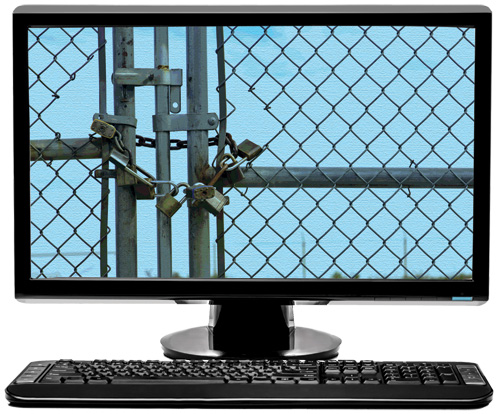
Internet filtering in schools and libraries is excessive and limits student learning, hurting low-income kids the most, according to a new report from the American Library Association (ALA). “Fencing out Knowledge: Impacts of the Children’s Internet Protection Act (CIPA) 10 Years Later” concluded that institutions that have installed filtering software on their Internet-accessible computers in order to receive certain federal funds routinely block more content than required, depriving students of access to information and collaborative tools. Poor students who may not otherwise have unfiltered Internet access are the most affected.
“Over-blocking in schools hampers students from developing their online presence and fully understanding the extent and permanence of their digital footprint,” reads the report, which was released by the ALA’s Office for Informational Technology Policy (OITP) and Office of Intellectual Freedom (OIF) and written by OITP consultant Kristin R. Batch.
Factors contributing to the over-implementation of CIPA included misinterpretation of the law; different perceptions of filtering; and various limitations of filtering software.
CIPA was passed in 2000 in order to “block adults and minors from accessing online images deemed ‘obscene,’ ‘child pornography,’ or ‘harmful to minors’ for minors less than 17 years old.” the report states. “Yet the use of the Internet is vastly different today than when the U.S. Supreme Court upheld the constitutionality of this law in 2003. Indeed, decision makers could not have predicted the ways in which the Internet and devices used to access online content would revolutionize learning opportunities in and out of school.”
The study looked at the challenges that filtering poses for both schools and public libraries. Addressing the lack of transparency in filtering software, the report identified several cases of overreaching filtering. Throughout Rhode Island schools, for instance, students are prevented from accessing 89 categories of content, which bans them from websites such as those of the American Civil Liberties Union, People for Ethical Treatment of Animals, Planned Parenthood, and the National Organization for Marriage.
“While the librarian side of me is pushing for open access and user privacy, the school administrator in me is worried,” Christopher Harris, chair of the OITP Advisory Committee, wrote in an accompanying article posted on the District Dispatch, the official ALA Washington Office Blog, that provides perspective on the report. “As an administrator, I am charged by New York State law to act in loco parentis—in the place of a parent—protecting students from harm.” Public libraries do not have such mandates for their child patrons.
In an earlier panel discussion focusing on the report’s findings during the 2014 ALA Midwinter Meeting, Harris elaborated on why schools need filters, despite their faulty implementation. “I say it’s probably good we have filters in schools,” he said, referring to schools’ in loco parentis responsibility. “There’s bad stuff we don’t want even accidentally to come up.” While a youth downloading porn from a public library computer would likely just be told to leave, such an incident in a school setting could result in tabloid headlines, he noted.
Regarding filtering in public libraries, “Fencing Out Knowledge” looked at the issue as it related to the library mission and in the context of a growing demand for public library services and reliance on the Internet for information. “Given increased demand and the mission to provide free and open access to information for all, libraries find that Internet filtering poses fundamental challenges to intellectual freedom,” the report states. “Filtering also conflicts directly with core professional values of librarians as articulated in ALA’s Library Bill of Rights. As Internet filters, by design, block access to content, not only are they incompatible with library values, but for many librarians they also constitute censorship.” The Library Bill of Rights celebrates its 75th birthday this month.
The report concludes with several suggested plans of action to address the filtering issue. Batch noted that librarians are in a position to improve school Internet acceptable use policies and raise colleagues’ awareness of over-filtering’s consequences. ALA will work with educational groups and create a toolkit for revamping Internet policies.
While there won’t be a specific conference program focused on the CIPA report during the ALA Annual Conference from June 26–July 1, according to an ALA spokesperson, the OIF leaders will discuss its consequences at the Joint Children’s Divisions Committee meeting.



The report is factually and legally false. It is intended to mislead. It does mislead. I know, because part of the sourced references were written to counteract my successfully advising a few people that the ALA’s Office for Intellectual Freedom was intentionally misleading people, and one even names me.
Any educators reading this SLJ story? It’s intended to mislead you into thinking the ALA’s report is factual. It is not. And neither is this SLJ story. For example, “school Internet acceptable use policies” never work to stop inappropriate material. Filters do. For example, “Internet filters … constitute censorship.” The US Supreme Court said the exact opposite (in the context of public libraries).
What is true is that some schools block too much. Corrections can be made without throwing out the baby with the bathwater.
“ALA will work with educational groups and create a toolkit for revamping Internet policies.” No it won’t. It works to get rid of filters and hides from the public the behind-the-scenes agitprop used to mislead librarians.
Hey SLJ, are you going to report on the “ALA Report” or simply repeat the report?
Most filters have a legitimate way to allow needed or desired sites that have been blocked. You usually just need to contact the person that is in charge of the technology for your organization. The filters are needed to protect the children from the sites that are not appropriate or not safe for them.